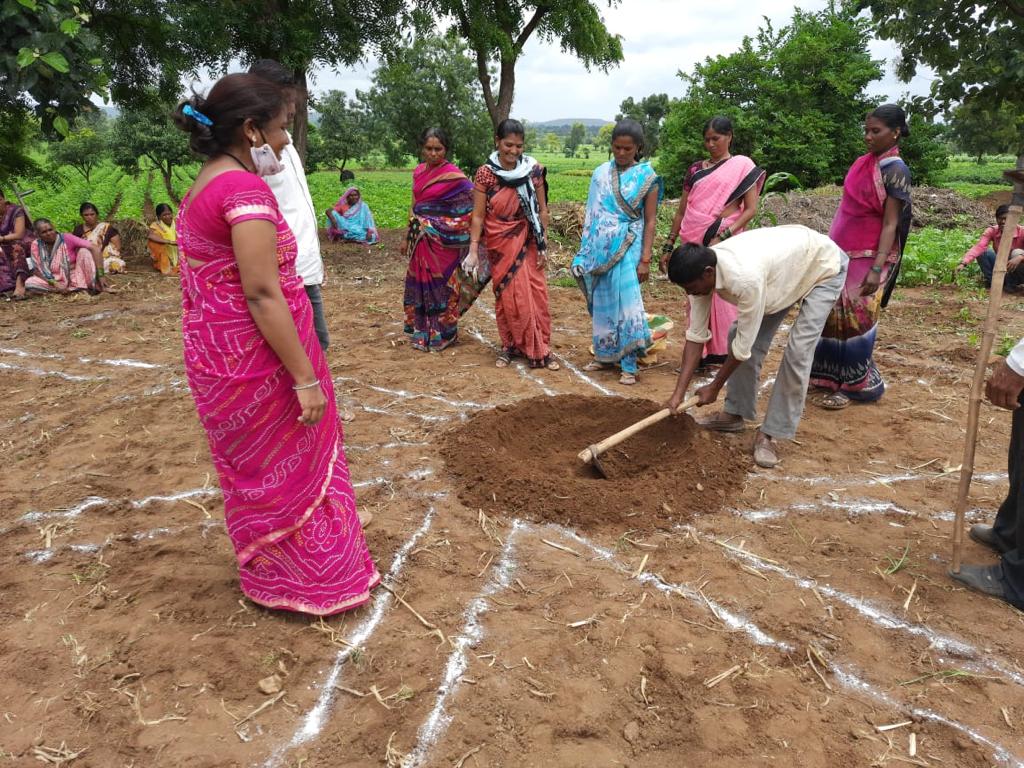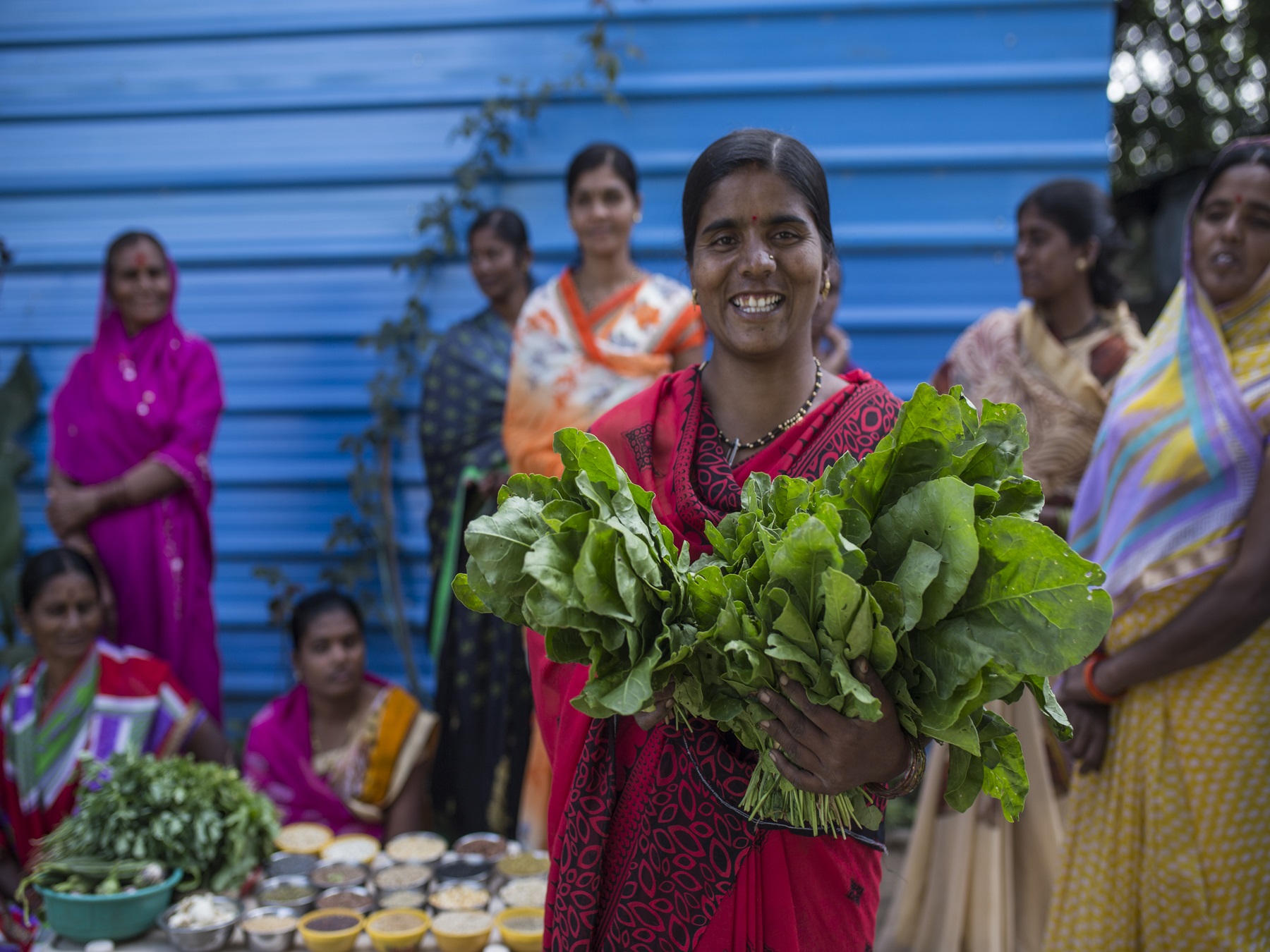Building a Women-led Movement for Change at Scale in India
Capacity and knowledge winners of the GCA Local Adaptation Champions Awards support women to switch crops for environmental and income sustainability
I
n the western Indian state of Maharashtra, the predominance of water-intensive cash crops often leaves farmers exposed to climate shocks such as poor monsoon seasons. “Our agriculture work with women started when they told us they had no food to eat,” says Upmanyu Patil, Director of Programs, Swayam Shikshan Prayog.
Along with the women in the community, Swayam Shikshan Prayog created the “one-acre” Climate Resilient Farming model: women borrow a parcel of land, one acre or less, from their families, to cultivate food crops for their families instead of only water-intensive cash crops like soybean and sugarcane. Rural women from small-scale farmer households, who are often not recognized as farmers in their own right, were transformed from laborers to leaders in agriculture. “We were trying to ensure food security for the families first,” says Patil. “The women grow food on the farm to feed their families, and do it in organic, water-efficient, and low-cost ways.”
“Growing [cash] crops creates a dependence on expensive chemical fertilizers, pesticides and market-bought hybrid seeds for the farmers, steeply increasing the cost of cultivation,” explains Patil. Receiving the Award in the capacity and knowledge category, the women-led initiative now supports farmers to transition from cash crops to food crops, and from chemical to bio inputs, supporting the conservation of soil and water while promoting more diversified and resilient livelihoods and businesses.
Shifting from dependence to resilience
What they grow and what activity they take up is a decision women make based on their specific needs. “Some women started selling their organically grown produce at the market,” said Malan Raut, one woman leader from Nagarsoga, Latur, in Maharashtra. “While some started door-to-door selling of homemade poppadoms and masalas. Yet, others started a business in animal husbandry and poultry.” Their efforts and perseverance paid off. “We are now self-sufficient getting milk from our cattle, and vegetable and grains from our fields. Our husbands consult us in affairs of the home, before making decisions.” As they acquired IT and computer skills, and started encouraging women in neighboring villages to join the movement, they became more engaged and resourceful, and their opinions became sought at all levels. “As empowered women, we too were working to find viable solutions to climate change,” she continued. “We started taking the initiative to resolve issues related to our society.”

Building a movement for change at scale
In seven years, 75,000 women farmers and households have begun the shift towards climate-resilient farming in over 750 villages across Osmanabad, Latur, Solapur, and Nanded districts of Maharashtra, and the process is being scaled up to Jalna, Ahmednagar and Aurangabad districts, and to Bihar and Kerala states in India. Since 2014, 75,000 women farmers across Maharashtra have been able to increase their food crop yield by 25% and decrease agricultural inputs cost by 25%. A total of 65,000 acres have been brought under bio farming, and now the organization aims to scale up their intervention to one million families across 2,000 villages. The initiative also organizes women farmers into collectives, providing support to gain land rights and start enterprises.

In seven years, 75,000 women farmers and households have begun the shift towards climate-resilient farming in over 750 villages across Osmanabad, Latur, Solapur, and Nanded districts of Maharashtra, and the process is being scaled up to Jalna, Ahmednagar and Aurangabad districts, and to Bihar and Kerala states in India. Since 2014, 75,000 women farmers across Maharashtra have been able to increase their food crop yield by 25% and decrease agricultural inputs cost by 25%. A total of 65,000 acres have been brought under bio farming, and now the organization aims to scale up their intervention to one million families across 2,000 villages. The initiative also organizes women farmers into collectives, providing support to gain land rights and start enterprises.
Professor Patrick Verkooijen, Chief Executive Officer of the Global Center on Adaptation, said: “Climate-resilient farming models are key in achieving food security for climate-vulnerable communities. Swayam Shikshan Prayog’s four-fold objectives put the emphasis on impact multipliers and the concept looks at ‘ownership’ as means to optimize ground deployment. Swayam Shikshan Prayog has demonstrated impact in its eight years of operation and is clear on its next objectives.”
Jury Member Ban Ki-moon, Chair of the Global Center on Adaptation and 8th Secretary-General of the United Nations, said: “Swayam Shikshan Prayog empowers women to become agricultural leaders rather than laborers. In the process they are not only able to feed their families but also in time produce a marketable surplus to generate income.”
Saima Wazed Putul, Thematic Ambassador for Vulnerability of The Climate Vulnerable Forum, also a Jury Member, added: “This takes a specific group (women) and not only teaches them what to do, but also how to do it. In the long run, the showcasing of success stories would eventually bring greater change in farming and food-growing practices. This is the kind of example we need in our region particularly since food shortage is a growing global concern.”